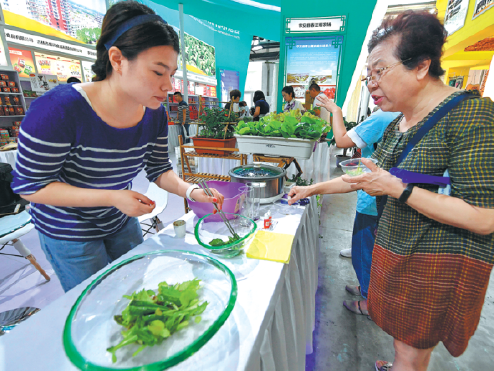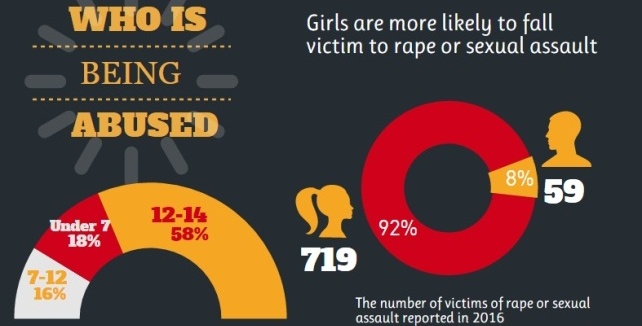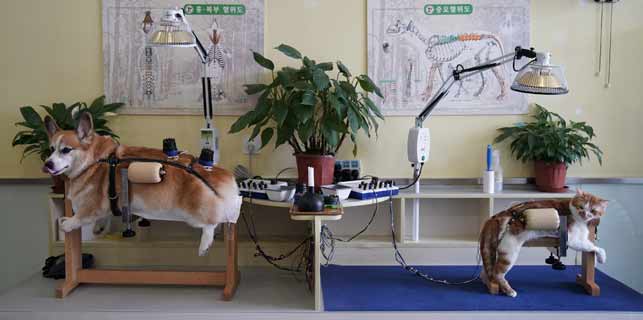Grown-to-order fruit, veg a hit with young urbanites
 |
|
A visitor tastes fresh vegetable salad offered by an exhibitor at the 16th China Changchun International Agriculture and Food Fair, which closed on Sunday in Changchun, Jilin province. [Photo/Xinhua] |
Cameras on farms allow customers to monitor crops on cellphones and computers
In spring, Li Mingtong, a university student in Changchun, Jilin province paid 500 yuan ($75) to have a pomegranate tree organically cultivated.
In the fall, she received boxes of fruit from her tree, located thousands of kilometers away in Yunnan province.
"Though the pomegranates were very expensive, they were safe and tasted good," she said.
Li arranged the service through an online shop. She now plans to buy customized vegetables grown in the suburbs of Changchun.
As Chinese pay more attention to food safety, customized farm produce, grown without using pesticides or fertilizers, is attracting interest from well-off urban consumers, especially the younger generation.
The internet is assisting supply-side reform in agriculture. Customers can rent a piece of land online and choose which varieties of vegetables they want to have grown there. Many farms have cameras so that customers can monitor the growth of their produce on their mobile phones or computers.
"Our fruits and vegetables are all organic. We adopted a membership model for the sale and delivery of produce to our clients," Chen Zhao, general manager of Chunjiangyan farm in Nongan county, Changchun, said at the 16th China Changchun International Agriculture and Food Fair, which closed on Sunday.
The farm has 47 vegetable and fruit greenhouses, and 1,000 members. Each day, more than 100 residents receive vegetables delivered from the farm, according to Chen.
"Our capacity is insufficient. For example, when our cantaloupes were ready for sale, we could only meet half the demand from our customers," he said.
The government has required deepening of supplyside reform in agriculture, improvement of the sector's structure, promotion of green production and innovation, and extension of the industrial and value chain.
According to a report released last year by Ali Research Institute, which is affiliated to e-commerce giant Alibaba, China had 65 million "online green consumers" in 2015, 15 times as many as in 2011.
Green products include organic and additive-free food and environmentally friendly household commodities such as furniture and clothes. Green consumption has spread most rapidly among people aged 23 to 28, according to the research.
"Our pigs have serial numbers. We have cameras in their pens so that our customers can check their condition at any time on their mobile phones," Pei Feng, from an agricultural cooperative in Siping, said at the Changchun agriculture fair.
The pigs are fed corn and bean pulp. The cooperative does not use any antibiotics or hormones, according to Pei, who added their services are expanding.
The green model for customized agriproducts has been piloted in many other places, such as Beijing and the Xinjiang Uygur autonomous region.
China has more than 10,000 accredited green food companies producing more than 26,000 types of products, according to statistics from the China Green Food Development Center, which oversees the country's organic food standards.
Despite the huge potential for customized produce, there are some concerns about whether the products are organic.
Technology such as cameras can record the cultivation methods to some extent, but the certification of organic products requires a large investment, said a farmworker in Jilin.
Some green farm produce does not have organic certification.
"Consumers pay high prices for customized produce to ensure safety. But the industry is still in the early stages. There are both good and bad producers," said Zhao Yumin, secretary-general of Jilin Specialty Products Processing Association.
It is difficult for consumers to confirm if their products are organic or not, therefore certification by professional agencies is necessary to boost reliability, Zhao said.
Liu Yuansheng, of Jilin University of Finance and Economics, said the key to selling customized agriproducts lucratively lies in the application of a trackable system, which is currently a weak link.
















